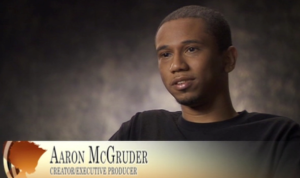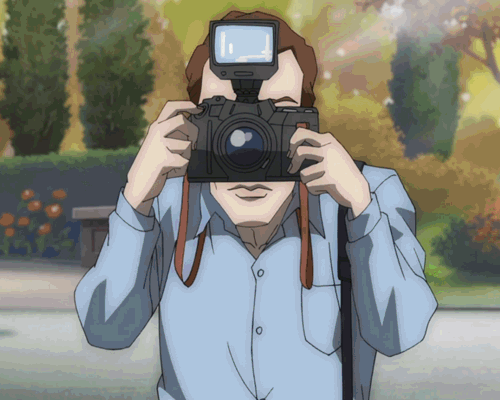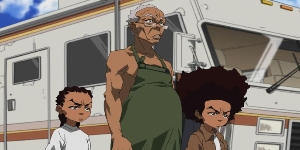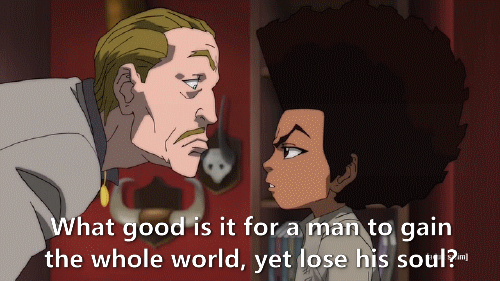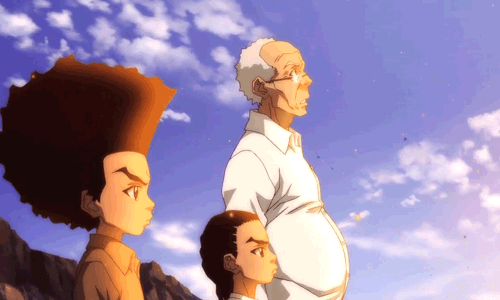“The Boondocks’” third season wasn’t the strongest piece of work attached to the show, but felt like a fitting end with Huey Freeman (the afro-wearing black freedom fighter accused of terroristic activity thanks to his penchant for telling observational truths) walking away a hero thanks to helping prevent a pseudo-terroristic attack. As Huey, his little brother Riley and their grandfather Robert headed into the distance – illuminated by the bright moon hovering above them – Grandpa Freeman remarked how the family would avoid so much trouble if they listened to Huey. In reality, that’s what “The Boondocks” was/is all about: the Freeman’s lives being affected by whether or not someone listened to the conscience of Woodcrest (the town the family lived in) – a.k.a. “Huey Freeman”.
Fast forward almost four years after “The Boondocks’” believed final episode aired and a true confirmation spread through the Internet that a fourth season would air in April of 2014. Fans everywhere jumped for joy that one of their favorite (if not their absolute favorite) TV shows was coming back. But less than a month before the (re)scheduled airing of season four, the animated series’ creator Aaron McGruder announced his moving away from his “baby” to work on an “Adult Swim” live-action series entitled “Black Jesus”. Though reasonably concerned about the season’s quality without its creator, fans still had faith that the men and women who worked with McGruder over the first three seasons would be able to take the ball and run with it even if they didn’t have their fearless leader (not a hyperbole) to coach them.
Then season four’s first episode premiered; titled “Pretty Boy Flizzy”. The show featured a troubled R & B singer by the name of – you guessed it – Pretty Boy Flizzy having run-ins with the law, beating his girlfriend and demeaning women while trying to convince lawyer Tom Dubois to be a man that women like Tom’s bored wife fantasized about. If you think this is a summary of a previous season’s ideas spliced together, you’d be right as the episode appears to be nothing more than a retake of the second season’s “Tom, Sarah and Usher” episode. But the fourth season never consistently improved.
Season four’s main, ongoing plot was the financial debt Robert Freeman created that fell onto the shoulders of himself and his family. Thanks to a refusal to read the fine print on credit card applications, bank loan offers and reverse mortgage forms (the final contract was what put him in the seven-figure debt range in the first place), Robert Freeman sold himself and his family into slavery. Literal slavery. What seemed to be a story that wouldn’t make it past the chronologically aired-second episode (“Good Times”) extended beyond its origins and even branched off to create more stories like Granddad Freeman becoming an emotional prostitute for emotionally damaged women under the strong pimp hand of local nursing home residents. With that being written, one can’t help but notice when the series reached its conclusion (production code or not), the story of the Freeman family’s finances was never finished. No money restoration, or selling Robert’s car before moving into the Y.M.C.A. Just a complete, almost lazy open-ended ending unlike anything seen in the series.
That’s not to say everything was about the Freemans. There were some interesting stories sprinkled throughout the final season … that were only summarized and never given a chance to be focused upon. During the aforementioned “Good Times” episode, it was revealed that Uncle Ruckus gained some financial backing from Ed Wuncler Sr. to run for election in the 2012 United States Presidential race. After failing to become the second “black” U.S. President, Uncle Ruckus entered the bidding for Woodcrest’s next mayor. Whether or not Uncle Ruckus won his mayoral bid is a mystery to everyone other than, possibly, the writers themselves. For goodness sakes, Uncle Ruckus was still shining shoes during his campaign.
The satire took a drop in quality as well. Not only was Chris Brown’s six-year-old assault on Rihanna referenced in the first aired episode, but also easy targets like the Kardashians (“Kardashia Kardashian” is the best they could come up with for a fake Kardashian name?), technology becoming aware and even remaking the first episode of “Breaking Bad” (an episode that originally aired during the second season of “The Boondocks” six years ago and a series that had reached its critically-acclaimed conclusion before season four aired). While the constant “Good Times” theme song references worked well in the episode of the same name, the funny wore off pretty quickly; just like season four as a whole.
Not even the strength of characters such as Huey and Riley could save the season. Well, actually their strengths weren’t so strong anymore. With the season becoming more of the “Robert Freeman Show” (played wonderfully by John Witherspoon), the characters the entire series was built on moved into the background. Huey’s moments of reason were few and far between; his voice only being heard to reemphasize the terrible financial state his family was currently in and what his grandfather was doing wrong. Instead of being a visionary, Huey became the annoying gnat that couldn’t be swatted or shooed away. Riley was even worse as he seemed to just whine and spout the same catchphrases over and over again (with one of his infamous lines actually being the focus of an entire episode).
Though there is a lot negativity that has made this article what it is doesn’t mean everything about season four was terrible. There were a few episodes where everything clicked. Look no further than “Freedomland”. The seventh-aired episode featured the Freeman’s be turned into real slaves under the false pretense of working for a highly-controversial American Slave Trade-themed amusement park. “Freedomland” perfectly mixed the abrasive truth of people finding enjoyment in the abuse of others with funny moments (mostly thanks to Uncle Ruckus finally living his dream of being a cotton field slave boss) and the great moral question of, “Is it worth financial stability to lose your freedom?” Yet it’s very easy to understand why people would hate the blatant racism displayed in “Freedomland” that went beyond even “The Boondocks’” levels.
And then there’s the mockumentary episode featuring a young Robert Freeman being forced to become a freedom rider during the height of the civil rights movement. Even the premier episode had its truthful, if not rehashed moments and dated observations (dated only because of who Pretty Boy Flizzy was based off of and the situation therein; not the truths).
Yes, “The Boondocks” season four still satirically jabbed the oh-so-real problems in music, pop culture, politics, religion and even the “normal” family structure we as fans had come to know and love. But the essence behind all of those topics was missing. From devalued characters to plot points being dropped or unfinished/unfulfilled, season four felt like an incomplete product created by a group of individuals struggling to capture lightning in a bottle. Or maybe a better analogy would be Huey shaking his head at the Mother Teresa-like woman who sacrificed all decency and honor for fifteen minutes of reality TV show fame during the “Granddad Dates a Kardashian” episode.
Similar to “Chappelle’s Show” before it, “The Boondocks” seasons one through three represented that next stage in introspective, slightly (to blatantly) abrasive comedy that would make you laugh before settling into your mind for a moment of revelation and, hopefully, awareness and change. Season four, on the other hand, was nothing more than a caricature of its former self. Just like Huey’s voice becoming white noise to the ears of his grandfather and brother (and eventually the viewing audience during this final season), “The Boondocks’” last hurrah on television focused less on growth and more on trying to compete with its own legacy; and sadly falling short.


